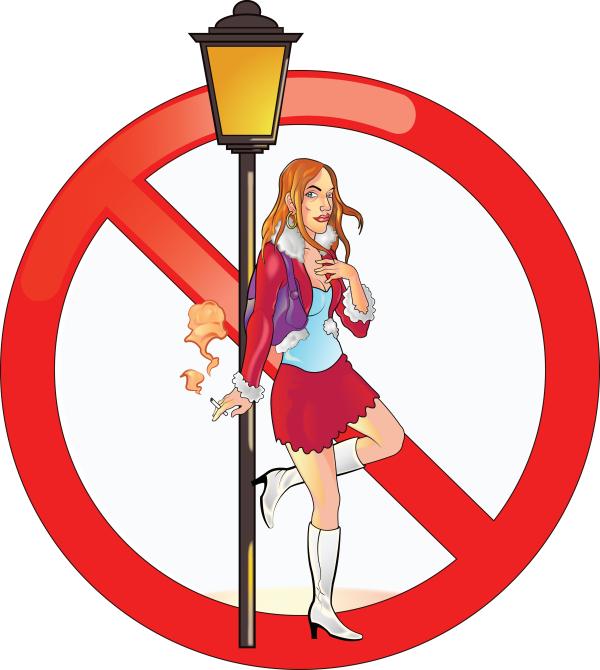The year is 2006. Suddenly it is acceptable again to use the word “whore” in Norwegian newspapers. According to the national press, Nigerian women are flocking to Norway to sell sexual services. “Stop the invasion of whores” and “Whore-town” are examples of the wording used in media headlines at this time.
The good fight
“The press forgot that these were women who we were supposed to feel sorry for and rescue,” says social researcher May-Len Skilbrei. She has analyzed the media coverage of prostitution from the 1970s to the present day in order to explain why Norway has criminalized the purchase of sexual services. She characterizes the 2000s as the decade of human trafficking. It was also the decade when Norway enacted the Sex Purchase Act.
“Nobody will admit that they supported criminalization because they wanted to get rid of the black women. Many people, such as radical feminists, have an interest in defining the introduction of the Sex Purchase Act as a fight for women’s right and a feminist victory – as the ‘good fight’,” says Skilbrei.
Norwegian men as victims
The analysis of the media coverage indicates that the 2000s were not only the decade of human trafficking, but also the decade of migration fears. Foreign prostitution in itself was not a new phenomenon in Norway. In the 1980s prostitutes came from Thailand, and in the 1990s they came from Russia. But migration did not dominate the debate before the Nigerians openly sold sex on the capital city’s pedestrian boulevard.
“Several political parties suddenly wanted to criminalize certain ways of selling sex in Oslo. When prostitution was presented as a phenomenon that got worse and worse, solutions had to be found. Some media depicted Norwegian men as victims of the ‘nasty’ Nigerian women, and the Norwegian women who sold sex became a part of the ‘we’. They were interviewed about the Nigerian women,” says the researcher.
Society was supposed to rescue the victims of human trafficking. The highly visible Nigerian prostitutes, however, were a problem that society wanted to get rid of.
See also: Norwegian ban on buying sex affects immigrant women
International interest in Norway
Skilbrei’s analyses of the Norwegian debate on prostitution have been published in the international journal “Sexuality Research and Social Policy”.
“There is enormous demand for this internationally. The analyses provide some answers to how and why Norway adopted a sex purchase law. The general public and researchers want to understand how the discussion unfolded. They want to understand what it was that propelled the debate forward,” says Skilbrei.
Limited debate in the public sector
“Compared with other fields that attract just as much media attention, there is very little paperwork from the public sector on this topic, but a great deal of public debate, especially in the newspapers,” says Skilbrei
“Sweden often conducts more detailed planning processes before making policy changes. They carried out seven evaluations related to prostitution before they criminalized the purchase of sex in 1999. In Norway, politicians presented their views in the media and from the speaker’s podium in the Parliament. But we have never had an entire action plan on prostitution,” says the social researcher.
“When an issue is defined as a problem in the media, politicians have to deliver a solution,” she adds.
Women who deceive men
Articles from the 1950s and 1960s portray prostitution as an obvious and understandable social phenomenon in which young women deceive men. The women are infectious, the men guiltless. But something happens in the 1970s.
“The 1970s was a decade of social movements. More phenomena were problematized and there was more concern for groups, not just for individuals,” says Skilbrei.
At this time the media writes about prostitution as if it were a symptom of another unwelcome phenomenon: Youth who roam the streets and use drugs. Prostitution is not defined as a problem in itself or for the people involved. It is depicted either as exotic or a nuisance, often tied to criminal activity. Society must do something about the problem, but not through legislation. Social work is the new, up-and-coming solution.
The “john”

In the 1980s, feminists come on the scene with a vengeance. Prostitution is clearly defined as a distinct social problem. It deals with women and it deals with violence. The focus shifts from those who sell sex to those who buy it. From pimps to society. Prostitution is synonymous with a situation in which some have power and money, while others do not. The literature deals with culture, structure and gender.
The 1990s are dominated by discussions about where prostitution takes place. It happens indoors and across borders. Massage institutes are found in people’s neighbourhoods, and Russian women enter the local communities in Northern Norway. Prostitution occurs where people live, and the fear of normalization, that buying and selling sex is becoming more acceptable, is a topic of debate. Social work is not enough; the anti-pimping law is strengthened and laws to prevent migration-related prostitution are discussed.
Best on human trafficking
Now we come to the 2000s. Norway signs the Palermo Protocols, the UN protocols against human trafficking. According to Skilbrei’s analyses, it is now almost impossible to talk about prostitution without talking about human trafficking. Human trafficking is criminalized to a greater extent, and international research on the topic increases markedly during this decade.
“The concept of human trafficking is not problematized by the media or politicians. This is something the media likes from the start, and something politicians use to profile themselves: being the best on human trafficking. Interest in foreign prostitution increases dramatically since human trafficking could be involved. Because Norway is a signatory to conventions, and because we want to be the best on issues like these, we move ahead full force. For instance, Norway has extremely generous schemes for victims,” Skilbrei explains.
Norway draws up action plans against human trafficking before any cases of it are identified in the country.
“This has to do with being the best in the class. It’s embarrassing that we have not produced any cases. Those working in the field are asked to find some. We must show that we are doing something, even though the international definition doesn’t always turn out to fit with reality,” she continues.
See also: Ban on the purchase of sex has changed attitudes
Universal solution to prostitution
According to Skilbrei, the feminist argument that prostitution is violence is not strong enough in itself to achieve criminalization. It is only when the situation is seen as being out of control, when the Nigerian prostitutes enter the public sphere, that strong action must be taken. The gravity of human trafficking makes it possible to circumvent the discussion that there are different kinds of prostitution requiring different kinds of measures. It paves the way for a universal solution, a solution that will also get the upper hand on the Nigerian women. A principled argument meets a pragmatic one, and on 1 January 2009 the purchase of sexual services is criminalized in Norway.

“Feminist discourse and choice of words narrowed down what could be proposed. The discussion about human trafficking swept everything else out of the way. Many countries have immigration laws against people who sell sex, but we defined them as victims, and we are good at saving victims. The only natural next step was criminalization,” says Skilbrei.
Ideological research field
Skilbrei cautions against a research field filled with ideological conflicts. Much of the literature on prostitution is unusable for research purposes because it is difficult to know if the conclusions are derived from the data or from the researcher’s political position.
“Other research fields are also dominated by strong ideologies. But I have conducted research in many other areas, such as schools and working life, and I have never experienced so much crying and blaming as I have at the conferences on prostitution. People have trouble taking neutral positions. If you are not against all prostitution, then you are for it,” explains Skilbrei.
Several researchers have left their jobs to become activists and take part in protest marches, either for or against prostitution.
“I try to take a position in the middle, and I am less interested in the kinds of laws we have than people think I am,” says Skilbrei.
Cultural expression
“I have analyzed the view of prostitution presented in the media as a cultural expression. An unequal power relationship lies at the heart of the way the problem is formulated in Norway. The state is supposed to remedy inequalities, so something must be done. In other countries this might mean implementing prevention or social measures. In Norway we have concluded that we need to eliminate the entire problem. Many would say that this is attacking a symptom of a fundamental inequality. We could combat poverty and inequality instead,” says Skilbrei.
Translated by Connie Stultz
May-Len Skilbrei is a sociologist and the managing director of the Institute for Applied International Studies at Fafo (Institute for Labour and Social Research).
In the article “The development of Norwegian prostitution policies” published in Sexuality Research and Social Policy no. 3.12, Skilbrei presents an analysis of how the Norwegian debate on prostitution has changed over four decades and how these changes have resulted in the criminalization of the purchase of sex in Norway.
As one of Norway’s foremost experts on the topic, Skilbrei’s participation in the public debate spans three decades. Next year her new book on Nordic prostitution policy will be published by the British publishing house Ashgate.


